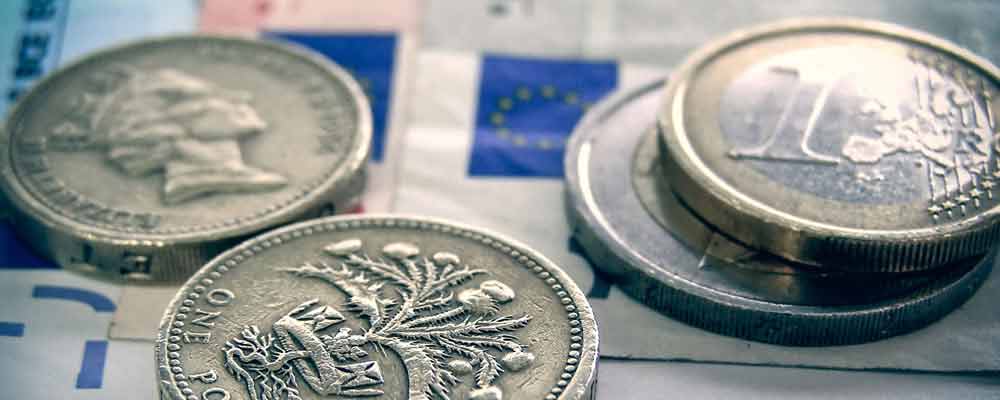- Euro Pound Exchange Rate Falls as BoE Leaves Rates on Hold – Without concrete data to refer to, Monetary Policy Committee elect to wait and see.
- Euro Demand Remains Subdued Amid Lacklustre Data, Italian Bank Crisis – This week’s ecostats have failed to pump the Euro as Italian banking uncertainty lingers.
- Pound Maintains Gains After Week of Healthy Gains – Hopeful political deliberation and the Bank of England’s reluctance to slash rates saw the Pound skyrocket.
- EUR/GBP Forecast to Rely on Sentiment as Ecostats Finish up for the Week
The Euro Pound exchange rate plummeted yesterday on the news that the Bank of England’s (BoE) Monetary Policy Committee (MPC) decided to leave interest rates and quantitative easing on hold.
The pairing rallied from Wednesday afternoon on the expectation that the BoE would elect to slash rates to at least 0.25%, with some analysts also hinting at the possibility of a full gutting to 0%. Previously, the Euro Pound exchange rate saw steady declines from the start of the week as the Tory party leadership race came to a head.
The Euro Pound exchange rate currently trades at 0.8306, little changed from the day’s opening levels.
Euro (EUR) Demand Kept Muted by Lacklustre Data and Continued Growth Concerns
The fall in Eurozone industrial production in May outlined by the latest data releases saw the Euro dip briefly on Wednesday. The report details the time period just before the UK’s EU membership referendum, and as such, the figures are likely to be more favourable than next month’s post-Brexit data.
The sustained high levels of uncertainty for the future of the Eurozone and European Union keep investors watching the common currency with a wary eye.
The Italian banking crisis continues to simmer on as Italy’s Prime Minister Matteo Renzi remains committed to bailing out the flagging Monte dei Paschi di Siena, the world’s oldest bank, with a taxpayer funded injection of capital. Over the past year the financial institution has seen an 80% decrease in share value as the bank threatens to collapse, leaving thousands of Italian households at risk.
As of January the first, new banking union rules from the EU forbade governments from using public money to bailout banks after the herculean amount of taxpayer capital funnelled into financial institutions during and after the 2008 world banking crisis.
The current woes for the Italian banking sector are neither new nor surprising as the Eurozone’s third biggest economy has languished since the 2008 financial crash. In an attempt to keep the country’s business and commercial sectors afloat, Italian banks lent out billions in loans to small companies struggling after the Great Recession.
At one point in 2013, more than 150 shops were closing every day and the country has failed to bounce bank since in any meaningful manner.
With little in the way of ecostats to elicit movement yesterday, the Euro was kept tamped down by the warnings of subdued growth for the currency bloc and the Economic and Financial Affairs Council’s intention to reprimand Spain and Portugal for the nations’ inability to narrow budget deficits.
However, today’s favourable Chinese GDP reports could lend the Euro support as the currency bloc has been eyeing trade with Asia for some time. This news has helped ease fears of a Chinese economic slowdown.
Sterling (GBP) Enjoys Monumental Rally on Bank of England Policy Announcement
Surprising Sterling investors, yesterday the Bank of England (BoE) announced it would be keeping its benchmark interest rate at 0.50% and would not be expanding its quantitative easing targets. In reaction, the Pound vaulted into 1%-2% rallies across the board as investors altered their positions to reflect the BoE’s decision.
It appears that Sterling will manage to hold on to the gains made yesterday as the currency continues to remain strong today, seeing further increases across the board.
Overall the Pound has had a rather favourable week. Sterling’s golden hour began on the news that Conservative party leadership hopeful Andrea Leadsom had conceded the race to favourite Theresa May.
The Pound was further bolstered on Theresa May’s instatement as Prime Minister of the United Kingdom as the political maelstrom surrounding the UK government post-Brexit relented somewhat.
On the same day May was sworn-in, newly appointed Chancellor of the Exchequer Philip Hammond announced he would not be enacting an emergency post-Brexit budget and previous comments about Hammond’s aversion to austerity saw the Pound gain further favour.
EUR/GBP Movement Dependent on Sentiment Ahead of Next Week’s Inflation Data
This morning’s Eurozone trade balance release has printed just below forecasts and, as a result, the Euro is likely to experience some fresh downside pressure.
Eurozone inflation has also showed a minor month-on-month decline in the non-core measure. Core CPI remained the same.
Once the European Central Bank’s (ECB) survey of professional forecasters is picked apart by analysts, any optimistic sentiment could see the Euro garner some investor attention, but the outlook is likely to be fairly conservative given the mass warnings of subdued European and global growth.
Somewhat disappointing, but low-impact, UK construction figures have further highlighted the plight of British business sectors. As the figures were compiled pre-Brexit, we can expect construction output to continue falling in the months ahead.
With no other ecostats set for release this week, Pound movement is likely to rest on any upcoming comments from central bankers and policy makers as the UK constructs its new government. However, next week’s UK CPI report is likely to inspire Euro Pound exchange rate movement.



